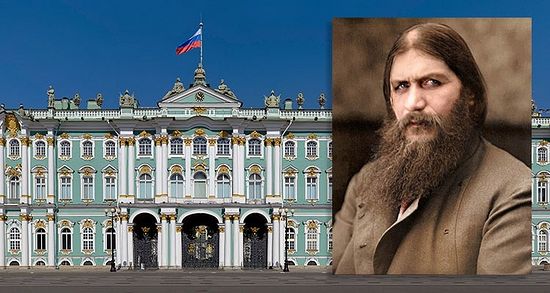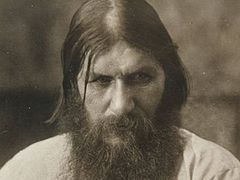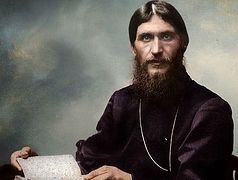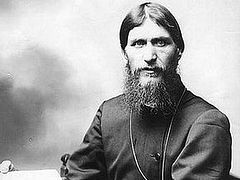The editorship of Orthodox Life is troubled by recent signs, even among certain members and clergy of the Russian Orthodox Church Abroad, of a revisionist history taking hold regarding the tumultuous and tragic events of the early 20th century — namely, the controversial and enigmatic figure of Grigory Efimovich Rasputin. We therefore offer this thorough and sober investigation by a respected scholar and historian of the Russian Church. May this question be finally put to rest, so that without discord and tumult in the Church, we may worthily honor the life and sufferings of the Holy Royal Martyrs and all the New Martyrs and Confessors of Russia, especially in the current and upcoming anniversary years.
A version of this article first appeared in the March 2017 issue of Holy Trinity Monastery’s Russian-language journal Православная Русь.
Russia is living through complicated times. The country is being reborn after disintegration and abasement. A torturous search for a national idea is afoot. All these processes are undergirded by a colossal, partly frenetic spiritual tension in our society. The huge number of magicians, astrologists, psychics, and healers who appear on television and in print are a clear indication that the populace is ill, and gravely so.
"So this messenger of death stands between the throne and Russia... He kills because he is two-faced."
One symptom of this illness is the veneration in certain — albeit narrow — circles of Grigory Efimovich Rasputin. The facts of his life are so widely known there is no need to recount them here. For us, a different question is important — why has a movement appeared for this person’s canonization and what are the arguments, both for and against? This discussion is unavoidable in order to develop a firm position on such a complex question and so as not to fall under the influence of pseudo-ecclesial agitators and, in the final equation, to not do harm to our own spiritual state.
Attempts to realize the canonization of Rasputin are fraught with several negative consequences. First, admirers of “elder Grigory” make of him a certain symbol of “folk Orthodox tradition,” set against the “bishops-bureaucrats.” The movement thereby carries an anti-ecclesial character. Even after the Commission on the Glorification of Saints of the Holy Synod of the Russian Orthodox Church has expressed its authoritative view against the glorification of Rasputin among the saints, his self-willed apologists nevertheless venerate him as a saintly elder and martyr.
Second, the canonization of such a character as Rasputin would throw a shadow upon the Royal Family and would undermine the credibility of their own glorification. Such an act would also be a huge gift to the anti-Orthodox media, giving them an excuse to pour dirt upon the Church.
Rasputin — Man and Myth
Did he truly love the Royal Family? If it were so, he would not have discredited them in the eyes of the public by his behavior.
Men like Rasputin appear specifically at moments of crisis and a tension immediately arises surrounding them. About him are layered a large number of the most varied myths. Some consider him a saint, others — a cunning and immoral scoundrel. It is difficult to prove or disprove anything when it comes to Rasputin. The thing is, the extant witness accounts of him conflict in the extreme. Even descriptions of his external appearance made by people who associated with him are so contradictory that one is given to wonder. Some write that he was tall, others — not so tall. Some write that he was, for a peasant, tidy, others — that he was dirty and unkempt. A singer who saw Rasputin many times describes his rotten teeth and foul breath; whereas the writer Zhukovskaia, who knew him well, informs us that his teeth were impeccable and every one intact, while his breath was fresh. Rasputin’s secretary writes that he had a wide mouth but that some sort of black roots were visible through it. Meanwhile Sazonov, an admirer of Rasputin, describes strong white teeth.
Read the rest at Orthodox Life.





It is authors like Anashkin who tarnish the Holy Royal Martyrs, not Rasputin.
While Anashkin makes unsubstantiated claims to "scholarship" anyone with a modicum of knowledge on this subject understands that he is speaking directly from the playbook of those who murdered the Royal Martyrs, who are those described in John 8:44, and Rev. 2:9 and 3:9. It is they who have controlled the twentieth century narrative to their own ends, devoid of truth. Perhaps Anashkin gets his information from Hollywood (CIA West)run by the same ones as described above, by Our Lord Himself.
May Anashkin have a good defense before the judgement seat of Christ, as he promotes the cause of those who put Him on the cross.
In the meantime, let's hope that the work of real scholars becomes more well known, as well as the true facts of the life of Rasputin, not the fairy tales invented to calumniate him, and in so doing, calumniating the Royal Martyrs.
Furthermore, how can the author state that the 'facts of his life are widely known' and therefore need not be repeated, when it is obvious from the article itself that these are wildly contradictory?
Do different standards apply to people who hold to a different version of events to that held by the author?
In spite of this, the idea that Rasputin's veneration is a sign of anti-clericalism and sectarianism is an interesting one. That the author should hold this view (which is the main point of the article) is also telling.
However, it cannot be denied that he helped to heal Alexei on a number of occasions.
I have read over the years many many different books regarding Rasputin. I have actually wondered on more than one occassion if there was another person impersonating him.
There are, at this point in time easy conclusions to make.
We must all be aware not to cast stones at anyone.
Gregory Novy (called Rasputin)
They are of their father the devil, and the lusts of their father they will do. He was a murderer from the beginning, and abode not in the truth, because there is no truth in him. When they speak a lie, they speak of their own: for their father is a liar, and the father of lies.
http://rasputin-photos.narod.ru/doc/eng/Tatyana_Mironova_eng.doc
http://www.events.orthodoxengland.org.uk/on-the-martyrdom-of-st-gregory-the-new/
“I feel that I shall leave life before January 1st. I wish to make known to the Russian people, to Papa (the Tsar), to the Russian Mother (the Tsarina) and to the Children what they must understand. If I am killed by common assassins, and especially by my brothers the Russian peasants, you, the Tsar of Russia, will have nothing to fear for your children, they will reign for hundreds of years. But if I am murdered by boyars, nobles, and if they shed my blood, their hands will remain soiled with my blood for twenty-five years and they will leave Russia. Brothers will kill brothers, and they will kill each other and hate each other, and for twenty-five years there will be no peace in the country.
Under the section ''The Question of Fr Nikolay Guryanov'', the author shoots himself since he essentially claims that Fr Nikolay, despite having a heart overflowing with love was essentially beguiled, and was unable to see things as would an historian. Sorry, but anyone who knows the basic fundamentals of Orthodox sanctity know that those whose hearts are clean, and who truly love God do not need to become historians - it is the Holy Spirit Who rests in them and helps them to delineate good from evil. The author subsequently contradicts himself in the final paragraph by saying that we should not trust historians either, despite earlier insinuating that Fr Nikolay was not an historian, and therefore unable to make a proper assessment of Rasputin. So no one (apart from the author himself no doubt) is essentially correct...
Priests are heretics, Elders with love flowing from their hearts are beguiled, since they are not historians, but historians should not be trusted. Alrighty then...